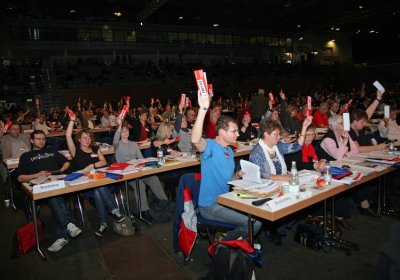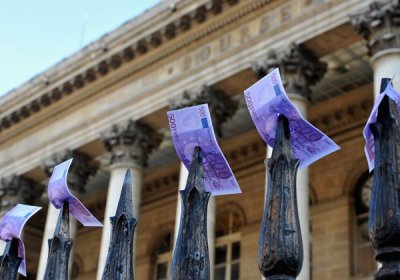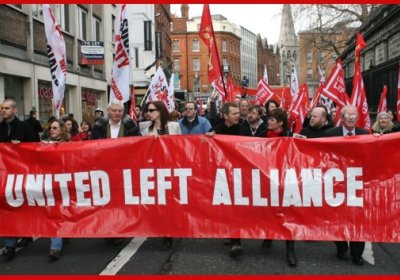Late on October 23, the culminating vote of the program congress of the German Left Party (Die Linke) came in Erfurt’s cavernous Congress Centre: 503 delegates raised their voting cards to support the document as finally amended by the congress, with only four against and 12 abstentions.
Die Linke has operated since 2007 on the basis of the “programmatic key points” that created Die Linke from the fusion of the Party of Democratic Socialism (PDS) and the Electoral Alternative for Labour and Social Justice (WASG).
Dick Nichols
World financial markets are increasingly staking billions on a bet that the eurozone is on its last legs. This bet on a euro break-up is looking more and more realistic, particularly because it becomes increasingly self-fulfilling as austerity programs bite and economic growth slows across Europe.
A very vicious circle is at work. Because of the rising wariness of financial institutions, in recent weeks the price of Italian and Spanish 10-year bonds has fallen. Their yield rose above 7% (bond prices and yields move in opposite directions).
The overwhelming success of the October 15 “United for Global Change” demonstrations (which took place in more than 1000 cities and towns in about 90 countries) is having powerful positive feedback on the indignados (15-M) movement in Spain.
At a Madrid media conference called by the 15-M movement to announce Spanish actions for the October 15 global day of occupations, the media showed little interest in the international solidarity plans of the world’s founding indignado movement.
The journos wanted to talk about one thing: what would be 15-M’s attitude to the November 20 Spanish general elections? Abstention? Spoiling the ballot? A vote against the parties of “the political class”? A vote for parties closest to 15-M’s positions? And, if so, which parties?
What stance should the European left take towards the euro and its galloping crisis?
This issue, which began as a theoretical discussion among radical economists in late 2009, has increasingly acquired practical political urgency: left parties are being challenged to define their position in the face of rising popular resentment at governments forking out billions in taxpayer euros to bail-out banks and indebted “Club Med” countries.
Speaking in Rome on September 15, Lorenzo Bini Smaghi, Italian executive board member of the European Central Bank (ECB), said of the design of the euro: “The assumption was made ― largely theoretical ― that there would be no crises.”
Oh, indeed. And now with Europe and the world showing every sign of dipping into a recession that will further stress Euope's common currency, what is to be done?
“Bloody Greeks — corrupt and lazy, born cheaters who think the world owes them a living. Why should the hard-working taxpayers of the euro zone core economies like Germany have to fund billion-euro rescue packages for those scoundrels?”
That’s the vicious tone of Germany’s tabloids and conservative politicians towards Greece’s galloping public debt crisis and the Greek people’s protests against the austerity programs.
The austerity has been imposed on them by the European Union, European Central Bank and International Monetary Fund (the “troika”) as the price of bail-out funding.
What the polls had predicted would be an easy victory for the Social Democrats in Denmark's September 15 election turned out to be much closer.
The last poll before the vote showed the Social Democrat leader Helle Thorning-Schmidt ahead of her Liberal opponent Lars Løkke Rasmussen by 52.3% to 47.5% as preferred prime minister.
In Spain the signs are unmistakable: a “hot autumn” of political and social conflict is brewing in the run-up to the November 20 general election.
Polling night will reveal how much the growing social resistance, brought onto the streets since May largely by the 15-M movement of “indignants”, has shaken up the political scene.
As things stand, the most likely result is a repeat of the wipe-out suffered by the governing Spanish Socialist Workers Party (PSOE) at the May elections for local council and regional governments (known as “autonomous communities”).
Ireland’s seven-month-old United Left Alliance (ULA) is the “new kid on the block” of European anti-capitalist parties.
Launched in November last year, it won five TDs (members of the Irish parliament, the Dail) in February elections, despite its name not appearing on the ballot paper.
To date the ULA has also won 20 positions in local councils and one seat in the European parliament.
In the Dail, the ULA TDs have already had successes, such as stopping the abolition of the Joint Labour Committees that set wages and conditions in some industries.
Huge demonstrations of the anti-austerity M-15 movement in 97 Spanish cities and towns brought at least 250,000 people onto the streets on June 19.
This vast and peaceful turnout marked a new phase in the rising struggle against the austerity policies of the country’s “parties of government” ― the Spanish Socialist Workers Party (PSOE), the People’s Party (PP) and the Catalan nationalist Convergence and Union (CiU) ― as well as against the recently adopted Euro stability pact.
The June 5 national elections in Portugal produced a sharp lurch to the right.
The two main conservative parties, the Social Democratic Party (PSD) and the Democratic and Social Centre-People's Party (CDS-PP) won 50.4% of votes and 57.1% of seats in the single-chamber parliament. (The results for the four seats determined by overseas Portuguese voters will be announced on June 15.)
Compared to the 2009 poll, the PSD vote rose from 29.1% to 38.6%, and CDS-PP from 10.5% to 11.7%.
- Previous page
- Page 22
- Next page









